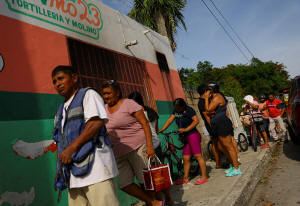|
Storms of a similar magnitude to the unusually fierce early
season hurricane are expected to become more common due to the
effects of climate change, said Rhea Pierre, the IFRC's disaster
manager for the English and Dutch-speaking Caribbean.
"The severity of damages in the aftermath of Hurricane Beryl are
tangible and devastating," said Pierre, speaking to reporters in
Geneva via video link from Port of Spain in Trinidad and Tobago.
"Unfortunately, this new reality of unprecedented hurricanes is
becoming the annual and ever present reality for the Caribbean
countries who are facing the brunt of climate change," she said,
adding that higher sea surface temperatures caused storms to
"strengthen quickly into major hurricanes".
The Office for the Coordination of Humanitarian Affairs (OCHA)
said that humanitarian assessments were ongoing to get a better
understanding of the extent of the damage caused by Beryl, which
the World Meteorological Organization said was setting the tone
for a very dangerous hurricane season.
OCHA spokesperson Vanessa Huguenin said partners in Grenada had
reported extreme damage to the islands of Carriacou and Petite
Martinique, where 70% and 97% of buildings were damaged,
respectively.
In Saint Vincent and the Grenadines, 90% of homes on Union
Island were affected, while nearly all buildings on the island
of Canouan sustained damage, Huguenin said.
"We are only at the beginning of the hurricane season. We still
have a staggering five months to go," Pierre said.
(Reporting by Gabrielle Tétrault-Farber; Editing by Helen
Popper)
[© 2024 Thomson Reuters. All
rights reserved.]
Copyright 2022 Reuters. All rights reserved. This material may
not be published, broadcast, rewritten or redistributed.
Thompson Reuters is solely responsible for this content.

|
|





